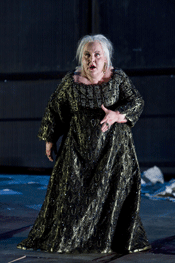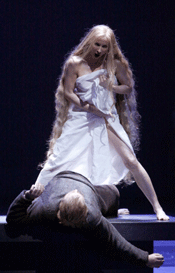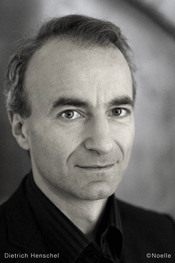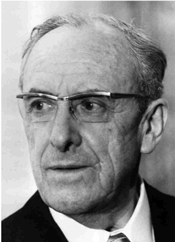![Deborah Polaski as Elektra [Photo by Eric Mahoudeau]](http://www.operatoday.com/Polaski_Elektra_Paris_2005.gif)
14 Jun 2009
Berlin: City of Three Operas
Where else in the world does one have three opera houses, all playing almost nightly for 10 months of the year? It’s one of the things that makes Berlin paradise for opera buffs.
English Touring Opera are delighted to announce a season of lyric monodramas to tour nationally from October to December. The season features music for solo singer and piano by Argento, Britten, Tippett and Shostakovich with a bold and inventive approach to making opera during social distancing.
This tenth of ten Live from London concerts was in fact a recorded live performance from California. It was no less enjoyable for that, and it was also uplifting to learn that this wasn’t in fact the ‘last’ LfL event that we will be able to enjoy, courtesy of VOCES8 and their fellow vocal ensembles (more below …).
Ever since Wigmore Hall announced their superb series of autumn concerts, all streamed live and available free of charge, I’d been looking forward to this song recital by Ian Bostridge and Imogen Cooper.
The Sixteen continues its exploration of Henry Purcell’s Welcome Songs for Charles II. As with Robert King’s pioneering Purcell series begun over thirty years ago for Hyperion, Harry Christophers is recording two Welcome Songs per disc.
Although Stile Antico’s programme article for their Live from London recital introduced their selection from the many treasures of the English Renaissance in the context of the theological debates and upheavals of the Tudor and Elizabethan years, their performance was more evocative of private chamber music than of public liturgy.
In February this year, Albanian soprano Ermonela Jaho made a highly lauded debut recital at Wigmore Hall - a concert which both celebrated Opera Rara’s 50th anniversary and honoured the career of the Italian soprano Rosina Storchio (1872-1945), the star of verismo who created the title roles in Leoncavallo’s La bohème and Zazà, Mascagni’s Lodoletta and Puccini’s Madama Butterfly.
Evidently, face masks don’t stifle appreciative “Bravo!”s. And, reducing audience numbers doesn’t lower the volume of such acclamations. For, the audience at Wigmore Hall gave soprano Elizabeth Llewellyn and pianist Simon Lepper a greatly deserved warm reception and hearty response following this lunchtime recital of late-Romantic song.
Collapsology. Or, perhaps we should use the French word ‘Collapsologie’ because this is a transdisciplinary idea pretty much advocated by a series of French theorists - and apparently, mostly French theorists. It in essence focuses on the imminent collapse of modern society and all its layers - a series of escalating crises on a global scale: environmental, economic, geopolitical, governmental; the list is extensive.
For this week’s Live from London vocal recital we moved from the home of VOCES8, St Anne and St Agnes in the City of London, to Kings Place, where The Sixteen - who have been associate artists at the venue for some time - presented a programme of music and words bound together by the theme of ‘reflection’.
'Such is your divine Disposation that both you excellently understand, and royally entertaine the Exercise of Musicke.’
Amongst an avalanche of new Mahler recordings appearing at the moment (Das Lied von der Erde seems to be the most favoured, with three) this 1991 Mahler Second from the 2nd Kassel MahlerFest is one of the more interesting releases.
‘And there was war in heaven: Michael and his angels fought against the dragon; and the dragon fought and his angels, And prevailed not; neither was their place found any more in heaven … that old serpent … Satan, which deceiveth the whole world: he was cast out into the earth, and his angels were cast out with him.’
If there is one myth, it seems believed by some people today, that probably needs shattering it is that post-war recordings or performances of Wagner operas were always of exceptional quality. This 1949 Hamburg Tristan und Isolde is one of those recordings - though quite who is to blame for its many problems takes quite some unearthing.
There was never any doubt that the fifth of the twelve Met Stars Live in Concert broadcasts was going to be a palpably intense and vivid event, as well as a musically stunning and theatrically enervating experience.
‘Love’ was the theme for this Live from London performance by Apollo5. Given the complexity and diversity of that human emotion, and Apollo5’s reputation for versatility and diverse repertoire, ranging from Renaissance choral music to jazz, from contemporary classical works to popular song, it was no surprise that their programme spanned 500 years and several musical styles.
The Academy of St Martin in the Fields have titled their autumn series of eight concerts - which are taking place at 5pm and 7.30pm on two Saturdays each month at their home venue in Trafalgar Square, and being filmed for streaming the following Thursday - ‘re:connect’.
The London Symphony Orchestra opened their Autumn 2020 season with a homage to Oliver Knussen, who died at the age of 66 in July 2018. The programme traced a national musical lineage through the twentieth century, from Britten to Knussen, on to Mark-Anthony Turnage, and entwining the LSO and Rattle too.
With the Live from London digital vocal festival entering the second half of the series, the festival’s host, VOCES8, returned to their home at St Annes and St Agnes in the City of London to present a sequence of ‘Choral Dances’ - vocal music inspired by dance, embracing diverse genres from the Renaissance madrigal to swing jazz.
Just a few unison string wriggles from the opening of Mozart’s overture to Le nozze di Figaro are enough to make any opera-lover perch on the edge of their seat, in excited anticipation of the drama in music to come, so there could be no other curtain-raiser for this Gala Concert at the Royal Opera House, the latest instalment from ‘their House’ to ‘our houses’.
"Before the ending of the day, creator of all things, we pray that, with your accustomed mercy, you may watch over us."
![Deborah Polaski as Elektra [Photo by Eric Mahoudeau]](http://www.operatoday.com/Polaski_Elektra_Paris_2005.gif)
Where else in the world does one have three opera houses, all playing almost nightly for 10 months of the year? It’s one of the things that makes Berlin paradise for opera buffs.
It was, for example, an ordinary Monday late in the season at Berlin’s Staatsoper. On stage was an Elektra new two years ago. Even with Deborah Polaski in the title role one expected at most a solid but routine performance. How wrong one can be!
This, it turned out, was an Elektra light years beyond the highest expectations that one might have — or have had, in every way: cast, orchestra. conductor and production team made this an evening that packed an unprecedented wallop — even for someone with 60 years of Elektras behind him.
Elektra has long been Polaski’s favorite and signature role. She first sang it, one reads, in 1984 on her 35th birthday. Since then she’s been on stage in the work — sometimes in concert — over 300 times.
And on May 25 it was, of course, Polaski who made the Staatsoper Elektra a soul-shattering experience. She’s a tall, well proportioned woman of infinite energy. Even after 100 minutes singing at emotional extremes almost without a break, there was no sign of fatigue.
 Jane Henschel as Klytemnästra [Photo by Clive Barda for Royal Opera House]
Jane Henschel as Klytemnästra [Photo by Clive Barda for Royal Opera House]
The audience was near collapse from the wrenching performance, but Polaski — exuberant in relishing the murder of mother Klytemnästra and step-father Aegisth — seemed capable of singing the entire opera again.
Polaski speaks of herself as a member of a functional family who thus has special insights into the dysfunctional household of these mythic Greeks.
In a recent interview she stressed that we know nothing of these characters earlier in their lives. Elektra, for example, might have once had a tender and loving mother in Klytemnästra and even in their heated confrontation in the opera might long again for such warmth.
It the kind of thinking that accounts for the intense profundity of Polaski’s portrayal. Great as she was on this evening, however, Polaski was almost upstaged by American mezzo Jane Henschel who took the tormented Klytemnästra through successive stages of despair, anxiety and dementia.
In the States, Henschel’s departure from the stage in hysterical laughter would have evoked wild applause, and even in Berlin one felt that the staid German audience was fighting the temptation to acclaim the singer‘s achievement.
Anne Schwanewilms was an unusually virginal sister Chrysothemis, and ageing Reiner Goldberg an impressive Aegisth.
In supporting roles, however, it was young German bass-baritone Hanno Müller-Brachmann who was a third star of the evening. He portrayed brother Orest as a totally autonomous individual who arrives with the single purpose of double murder and walks towards it essentially unperturbed by the fate of his sister. This, in turn, left Elektra doubly pathetic as she realized that she had failed to give him the axe that had killed father Agamemnon and that she had consecrated as the weapon of revenge. Director Dieter Dorn focused perceptive attention both on music and text and eschewed all theatrical trappings. And conductor Michael Boder made clear that the Staatskapelle, recently returned from its 10-concert New York Mahler cycle, is one of the world’s great orchestras.
More than in any of his other operas it is in Tannhäuser that Richard Wagner drew a clear line between a good girl and a bad one. The eponymous knight hero wallows first in Venus’ cesspool of seething sexuality, while virginal Elizabeth pines in vain for his affection.
 Nadja Michael as Venus
Nadja Michael as Venus
Yet the whore-virgin dichotomy does not hold — especially not when the two women are portrayed by a single singer, as was the case at the Deutsche Oper here on May 31. As Venus Germany’s Nadja Michael, famed elsewhere as a nude Salome, was a double for Lady Godiva. She was cloaked solely in copious knee-length blond locks, otherwise teasingly covering herself with a somewhat diaphanous white cloth. But as she moved toward transcendence as Elizabeth, Venus’ blond hair fell again from her head. But then it was only Elizabeth who had any understanding of Tannhäuser’s Act Two praise of sensuality to which his puritanical contemporaries responded with such horror.
The current DO production, new last January, did little to clarify matters. Director was Kirsten Harms, controversial general director — Intendantin — of the DO. Harms’ major mentors were the late Ruth Berghaus and Achim Freyer, mastermind of the current production of Wagner’s Ring des Nibelungen at Los Angeles Opera. (Both Berghaus and Freyer served apprenticeships in Bert Brecht’s Berlin Ensemble, where the concept of didactic theater was developed.) Harms’ production is a collage of brilliant — and original — ideas, but like so much of today’s Regieoper (a concept sometimes translated as “Eurotrash”) its many parts do not add up to a meaningful whole. And one can only marvel at a budget that makes such a staging possible.
Central to it was a stage that can be raised and lowered even with the company’s magnificent full chorus on it. Elizabeth’s “beloved hall” is peopled with a troop of armed men that bring to mind China’s terracotta warriors. It turns out, however, that they are mere props — tin Men of Oz, as it were — that then rise above the stage, where they remain suspended at various levels throughout the second and third acts. The pilgrims of Act Three, returning ill from Rome, are confined to a full stage of hospital beds, among which Elizabeth seeks her errant knight. (Did Harms perhaps have AIDS in mind?) Interesting, to be sure — but did it all throw new light on Tannhäuser? One rather had an image of Harms backstage — the kid in the toy shop — gleefully pushing buttons to raise and lower the stage. Happily, all this was offset by the musical excellence of the May 31 performance.
The chorus, the work of William Spaulding, is one of Berlin’s major musical glories and it brought new awareness to the immense role played by the ensemble in this work. And the chorus had its equal in the DO orchestra, conducted by French-born Philippe Auguin, who early in his career served as an assistant to Herbert von Karajan and Georg Solti.
 Dietrich Henschel [Photo by Noelle]
Dietrich Henschel [Photo by Noelle]
Although Michael was mesmerizing in her double role, the evening was stolen vocally by Dietrich Henschel, a late replacement for an ailing Markus Brück. Germany’s Henschel, a baritone often viewed as the successor to Dietrich Fischer-Dieskau, brought a depth to Wolfram von Eschenbach that left one wondering why Elizabeth did not respond to his wooing rather than holding out for the redeemed Tannhäuser of husky, Colorado-born Scott MacAllister.
After two decades with several German companies MacAllister has only recently moved into the heroic Fach. His is at best an adequate voice, and in a production focused so sharply on the visual an unlikely lover. In addition to the splendor of his voice and his interpretation of Wolfram, Henschel is well remembered as Don Giovanni at Berlin’s Komische Oper a few seasons ago. He sang the first act of the Mozart opera clad largely in white Jockey’s.
A new production of Tales of Hoffmann at Berlin’s Komische Oper is always of special interest, for Walter Felsenstein, who founded the company in 1947, made the Offenbach work a signature piece.
Indeed, Felsenstein’s 1958 staging of Hoffmann was the sensation of the final pre-Wall seasons in this then-divided city, when art-oriented West Berliners had two items at the top of their wish-list — both of them in the East of the city: a ticket to the Berlin Ensemble, whose master Bert Brecht had died only in 1956, and one to Felsenstein‘s Hoffmann at the Komische Oper.
 Walter Felsenstein
Walter Felsenstein
And although a half-century later that Hoffmann is vivid in the memory of those who saw it, others are today unaware of Felsenstein’s achievement not only in staging the opera, but in preparing an edition of it that gave the work the stature that it now enjoys in the international repertory.
For Offenbach died without leaving the world a definitive edition of this score that elevated him to a level above the operetta composer as which he was first famous. Yet there is no doubt much in the Hoffmann currently on stage at the KO that would cause Felsenstein to blush, for the East Germany that supported his theater so handsomely was a prudish society that would have winced at the open sexuality of Thilo Reinhardt’s production that was new two years ago.
Reinhardt moved Hoffmann to the present, staging all five act in a single setting by Paul Zoller that was easily transformed to accommodate the changing locales of the story.
True to Felsenstein’s concept of opera as music theater, the KO assembled a cast astonishing in its combination of physical appearance and vocal splendor. Best of the lot was Cornelia Götz, who played Olympia as a Marilyn-Monroe look-alike in blond wig and a heavy fur coat, under which she wore very little. Tatjana Gazdik was a mellow-voiced Antonia, while Karolina Gumos fell below the standard of her colleagues as Giulietta.
Andreas Conrad was a less-than-ideal Hoffmann, for his somewhat strident tenor was alien to the illusion-ridden Romantic that this figure is.
Nonetheless, the performance on May 30 was an evening of the high entertainment that confirmed the often-encountered opinion that the KO is the most adventurous and interesting of Berlin’s three opera houses.
Francois Xavier Roth conducted the superb KO orchestra with elan. Costumes were by Katharina Gault. (Newsreel footage of Felsenstein’s 1958 Hoffmann is available, by the way, in the 12-DVD documentation of the director’s work issued by ArtHaus a year ago.) [N.B. Click here for Opera Today’s review.]
A disquieting aspect of musical life in Berlin is the number of empty seats encountered at many events. At the May 31 performance of Tannhäuser at the Deutsche Oper, for example, the second balcony was half empty, and in the front rows of the orchestra dozens of seats went unsold.
At the Komische Oper, famous for its provocative stagings, empty seats abound despite the fact that it is by far the cheapest of Berlin’s three opera houses and that generous discounts prevail. Could this be in any way related to the fact that the KO still sings all operas in German?
And even a mostly-Wagner concert by Simon Rattle and the Berlin Philharmonic on May 28 was not sold out. This is especially sad for those who knew Berlin decades ago when there was never an empty seat anywhere. Indeed, many performances then were sold out by subscription at the outset of the season.
One hesitates to read the handwriting on the wall, for here too the audience is aging, and the interest in classical music among the young — although markedly stronger than in the States — is declining. Add to this the fact that Germany also is haunted by the world-wide financial crisis. One hears of budget cuts everywhere.
Yet behind all this looms a larger cause for alarm. It is still the vast amount of public money invested in them that makes Germany’s musical organizations unique — and great. How long will the taxpayer who never attends an opera be willing to continue such support?
Wes Blomster